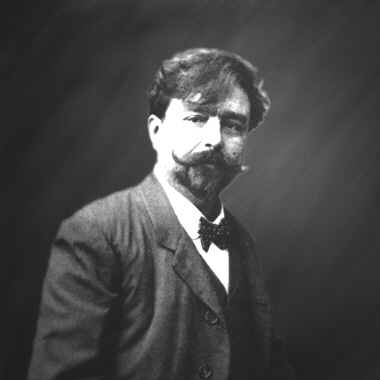
Isaac Albéniz

Spanish composer and pianist, Isaac Albéniz was known for his clarity and delicacy of tone. He used modal mixture along with Spanish rhythms, simple melodies and chromatic ornamentations as he sought to embody the Spanish landscape within his music.
At the age of three, Albéniz began piano lessons with his older sister Clementina. His musical aptitude was quickly recognized and he was taken to Paris to study privately with Antoine-Françoise Marmontel in preparation for the entrance exam for the Paris Conservatoire – admission to which he was denied based on immaturity. Since he was not enrolled in school, when his father lost his job, Albéniz and his sister supported the family financially through performing on tours which eventually brought them to Madrid where he enrolled at the Escuela Nacional de Música y Daclamación, however his education was often disrupted by the want to perform.
In 1875, his touring habits found him travelling to both Puerto Rico and Cuba. By 1876, Albéniz was ready for serious music study, however due to financial difficulties he only stayed two months at the Leipzig Conservatory. A local admirer, however, helped Albéniz financially by supporting him in his attendance to the Brussels Conservatory where he studied piano. By 1880, Albéniz found himself performing once again, but also began to conduct.
Wanting to also study composition, he moved to Barcelona in 1883 to study under Felipe Pedrell, during which time he also taught piano. Albéniz married his pupil, Rosa Jordana, in 1883. Moving to Madrid in 1885, Albéniz wove himself into society through the help of a friend by performing in the homes of nobility, organizing and participating in concerts, and teaching piano. By 1889, Albéniz had established a reputation for himself as a piano composer mainly with his salon pieces. Albéniz entered an exclusive contract with Henry Lowenfeld in 1890 as a resident composer and performing musician which required his family to relocate to London- which changed the course of his career. While in London, Albéniz found himself in contact with many individuals within the musical theatre community, composing for operas, and the success of <em>The Magic Opal</em> (later <em>The Magic Ring</em>) in 1893 gained for Albéniz a wealthy patron, Francis Burdett Money-Coutts, who collaborated with and supported him throughout the rest of his career. While in London, Albéniz also premiered <em>Poor Jonathan</em> in 1893.
Due to illness, Albéniz returned to Paris where he began work on <em>Henry Clifford</em> (1894), an opera well received by critics. His attempts following this to premier his works in Spain were not well received as they did not fit within the preferred conventional forms. He was seen as a local-man in foreign clothes which made him the recipient of jealousies and ridicule. <em>La vega</em> (1896) was his next big success, being the precursor for <em>Iberia</em> (1908) which is a collection of twelve “impressions” in four books where he captured the sounds and rhythms of his native Spain.
From 1898-1900 he taught piano at Schola Cantorum, however he had to resign due to declining health and he left his Parisian home and returned to the warmer climates of Spain where he focused mainly on composing. During the final years of his life, his most notable works were <em>Quatre melodies</em> (1908) and <em>Azulejos</em> (1909) which was left unfinished at the time of his death.



